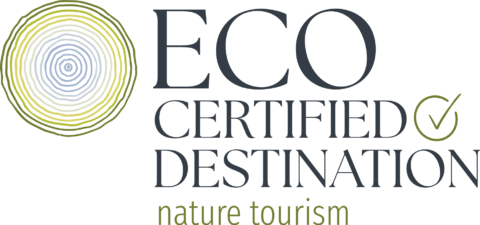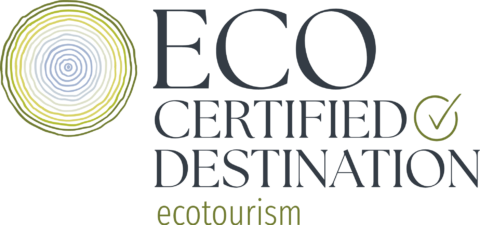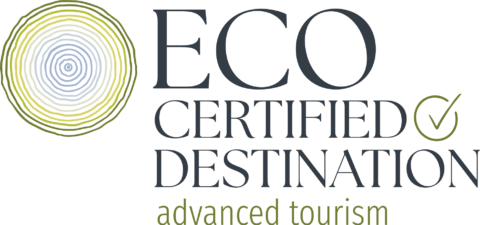Echo Point, Blue Mountains, NSW
Getting started on your ECO Destination Certification
The ECO Destination Certification program is available to all nature-based destinations and focuses on sustainability through a regional commitment to ecotourism and sustainable and responsible tourism practices.
The certification assures travellers that certified destinations are backed by a strong, well-managed commitment to sustainable practices and provide high-quality nature-based tourism experiences within the region.
The program is for a region or destination with a clearly defined boundary. It requires one organisation, like the local council or local tourism organisation, to be responsible for the management of the certification, however, it assesses the entire region’s tourism destination management practices community-wide and involves contribution from various destination stakeholders.
There are three levels of ECO Certification:

Nature Tourism Destination – Nature-based tourism destination with an emphasis on sustainable tourism, nature and environmental management through strong community and stakeholder connections.

Ecotourism Destination – Nature-based tourism destination with a strong commitment to ecotourism principles. This involves cultural and natural interpretation and education for visitors, and local business engagement in sustainability.

Advanced Ecotourism Destination – Nature-based tourism destination with an in-depth demonstration of commitment to ecotourism principles across all aspects of the tourism industry and community. This involves clear and current targets and monitoring for management of nature, environment, and culture, to not only preserve it but to improve these assets.
Contact Ecotourism Australia to discuss if the ECO Destination program is appropriate for your tourism destination.
Why ECO Destination Certification is a smart move for your destination
Achieving certified destination status signifies regions are demonstrating internationally recognised ecotourism or sustainable tourism credentials to visitors, stakeholders and the community in a manner that is credible and authenticated. In other words, it’s not just regions saying they’re sustainable; it’s independently assessed, verified, and audited!
With over 30 years’ experience pioneering ecotourism and sustainability with small- to medium-sized businesses and more recently supporting destinations through our certification programs, we ensure our program guides destination managers to improve the tourism industry’s sustainability practices from the ground up. Undertaking certification ultimately enhances the sustainability of your destination, keeping you accountable in sustainable management. It encourages you to implement and maintain high standard practices that will help you, your staff, the community, and the local visitor economy plan for the long term.

Aligning sustainability global best practice expectations by partnering with Green Destinations
To connect Australian destinations striving for sustainability with the rest of the world, Ecotourism Australia partnered with Green Destinations to bring global standards to Australia and connect with like-minded destination managers internationally.
What are the benefits of becoming certified?
1.
Become part of an international network of over 200 destinations supporting one another to increase sustainability standards globally.
2.
Local networking opportunities through engagement with ECO Destinations, regular network meetings and industry events.
3.
Access to globally recognised certification standards that continue to update regularly to continue to ensure you meet global best practice standards, accountability through the auditing cycle every 2 years.
4.
Ongoing support to drive sustainable tourism uptake amongst your tourism industry using best practice examples. Including regular reporting on the uptake and certification of operators in Ecotourism Australia’s business programs
5.
Complimentary nomination for applying and certified ECO Destinations in the Green Destinations Top 100 Stories Competition hosted by our partner Green Destinations.
6.
Your tourism destination will be recognised globally and receive official recognition for best environmental, socio-cultural, and professional practices.
You and travellers alike can find certified ECO Destinations listed on Ecotourism Australia’s Green Travel Guide
7.
Dedicated Ecotourism Australia’s destination logos to use on your website, promotional materials, and digital channels.
8.
Invitation to attend the Global Sustainable Tourism Summit and other networking events to discuss key topics, learn from experts including any destination only parts of the program.
9.
Ecotourism Australia membership and voting rights in the Annual General Meeting.
“By joining Ecotourism Australia, destinations gain access to a global network of sustainable destinations and expertise through Ecotourism Australia’s partnership with Green Destinations, the leading organisation connecting more than 200 destinations in 60 countries supported by more than 50 partners and representatives.”
Hugo de Jong, Founding Director, Green Destinations.
Is ECO Destination Certification the best suited program for me?
To be eligible to apply for ECO Destination Certification can you answer YES to the following questions:
- Do you have a nature-based destination with existing nature-based tourism products?
- Do you have ECO Certification, Sustainable Tourism Certification and Strive 4 Sustainability Scorecard uptake in your region?
- Does your destination offer a high-quality experience aimed at educating visitors about the natural heritage of the region and its sustainability values?
- Do you have a Destination Management Plan founded on sustainability principles?
Not a nature-based destination? You may like to consider the Sustainable Tourism Destination certification Program:
Next step: Preliminary assessment
If you answered yes to the above questions, the next step is to undergo a preliminary assessment to see how your region performs against our Destination Certification criteria prior to formalising your application.
The preliminary assessment inputs existing (publicly available) information into the online application portal on behalf of the destination and combines researching the region’s tourism, council, and land management websites for information, with interviews of key stakeholders who can provide further information and understanding.
Contact Ecotourism Australia to discuss if the ECO Destination program is appropriate for your tourism destination and to arrange a preliminary assessment.
What are the costs associated with certification?
Preliminary Assessment Prior to applying for ECO Destination Certification, it is a requirement to complete a preliminary assessment to evaluate the region’s existing practices and plans. This assessment is a once-off, flat rate cost and will provide the destination with a report of their current standing against the certification criteria to better inform decision making regarding certification.
Certification Fee + Support Package (First year only) To ensure the destination is supported effectively throughout its application, the certification fee is payable in conjunction with one of the support packages which is for the first 12months of application. This guarantees the support can be personalised and tailored to suit the region’s needs.
Annual Certification Fee (Second year onwards) In the second year and onwards, just the certification is billed annually regardless of being applicant or certified status.
The cost of ECO Destination Certification is based on the population of the region. Because we understand that each destination has varying needs and will be at different stages of their sustainability journey, the ECO Destination Certification program takes a tailored approach. A personalised pricing guide can be provided.
Register for ECO Destination Certification today!
Contact us to learn how the certification applies to your tourism destination and receive a personalised quote.
What should I expect when applying for ECO Destination Certification?
The program is broken down into 7 sections. Applicants need to answer a selection of questions based around the following:
-
- Destination Management – visitor monitoring, tourism impact assessments and sustainable destination planning
- Nature and Scenery – landscape and scenery management, biodiversity impact management, captive animal and wildlife interactions
- Environment and Climate – reduction targets and monitoring of waste, water, energy & emissions, delivery of soft mobility and public transport
- Culture and Tradition – tourism impact assessment on tangible and intangible Indigenous and European culture
- Social Wellbeing – economic & social impact monitoring, community and human rights and inclusion of community in sustainability
- Business and Hospitality – business support in waste, water, energy and emissions monitoring and reduction, authentic marketing, and sustainability education
- Ecotourism – incentives and rewards for sustainable businesses, engagement with protected area managers and Traditional Owners in tourism decision making.
Understanding your involvement
Completing your certification application takes time and commitment varies from destination to destination and is dependent on multiple variables. The process of certification allows a destination to proceed at its own speed, but on average an application for Nature level certification is reached within 12-18 months. A clear and dedicated resource to manage the application will be required, and committed input from all necessary internal and external stakeholders will be pivotal to the success of the certification application.
Pathway to your ECO Destination Certification
1.
Contact Ecotourism Australia to express your interest.
Undergo a preliminary destination assessment to assess eligibility and to inform your decision to progress into the program.
2.
Complete a personalised engagement form and pay your annual certification fee + support package fee (year 1 only).
3.
Host a site induction including presentations or meetings with key stakeholders/tourism industry, development of a communications and works plan.
4.
Complete your application by following the step-by-step guide on the portal. Your Certification Coach will also help you through the application process.
5.
Once the criteria are completed, your Certification Coach will conduct an internal review of your application.
6.
Your application will then be sent to an independent, third-party auditor to review your application and schedule a time for your onsite audit. The audit will take 2-3 days to complete. Allow 8-10 weeks for an audit to be organised, undertaken and reports provided.
7.
Upon a successful audit report and completed corrective actions, certification is awarded, and logos provided for advertising purposes. An announcement event is arranged in conjunction with the destination and Ecotourism Australia.
8.
Regular compliance audits will be conducted every four years and are a mandatory component for all certified businesses. A smaller online audit to ensure documents are updated is held every two years.
FAQs
Click on the frequently asked questions to find your answers. If you still have questions, contact eco@ecotourism.org.au
How do I know if I am ready to apply for destination certification?
The preliminary assessment will be a great tool to help you gauge if you are ready for certification. It will provide you clear understanding on how many criteria you are already doing well against, and what areas you will need to improve in before achieving certification. If you are just at the start of your sustainability journey as a destination, you may like to consider our Corporate Supporter Program to begin driving sustainability amongst your tourism industry as a first step.
As a destination can I apply for the Strive 4 Sustainability Scorecard?
If you have visitor facing product like a visitor centre, museum, or art gallery which is run by your council or local tourism organisation, yes you can apply for the scorecard for this product specifically, it will provide you a short introduction into sustainability. However, if you’re looking for something across the entire destination and region, your best starting point is a preliminary assessment to help you get a benchmark for the entire region.
What is the difference between ECO Destination Certification and Sustainable Tourism Destination Certification?
The ECO Certification program is for nature-based tourism businesses that assesses the financial, social, environmental, and cultural sustainability of business management. ECO Destination Certification concerns the region, including how the council and local tourism organisation supports its local tourism industry through their practices.
What is the difference between ECO Destination Certification and Sustainable Tourism Destination Certification?
ECO Destination Certification is for a nature-focused destinations with visitors coming to the region to experience the natural offering (e.g. diving, snorkelling, hiking). The Sustainable Tourism Destination is for an urban based region with food, drinks and culture at the heart of the experience.
What’s the difference between the levels of certification?
There are three levels of ECO Certification:
Nature Tourism Destination – Nature-based tourism destination with an emphasis on sustainable tourism, nature and environmental management through strong community and stakeholder connections.
73 criteria are required to complete this certification. An online audit is conducted every two years, and an onsite audit is conducted every four years.
Ecotourism Destination – Nature-based tourism destination with a strong commitment to ecotourism principles. This involves cultural and natural interpretation and education for visitors, and local business engagement in sustainability.
91 criteria are required to complete this certification. An online audit is conducted every two years, and an onsite audit is conducted every four years.
Advanced Ecotourism Destination – Nature-based tourism destination with an in-depth demonstration of commitment to ecotourism principles across all aspects of the tourism industry and community. This involves management of nature, environment, and culture, to not only preserve it but to improve these assets.
100 criteria are required to complete this certification. Audits are onsite and more rigorous and frequent, occurring every three years.
You don’t need to decide which level to apply for straight away. Once you have applied for certification you will get access to all levels in the portal, making it easier to decide as you go through the application process. You can also speak to one of our certification specialists who will be happy to guide you.
How much does it cost to become certified?
Prior to applying for ECO Destination Certification, it is a requirement to complete a preliminary assessment to evaluate the region’s existing practices and plans. This assessment is a once-off, flat rate cost and will provide the destination with a report of their current standing against the certification criteria to better inform decision making regarding certification.
The cost of ECO Destination Certification is based on the population of the region. In the first year only, destinations are required to also purchase a support package to ensure the destination is supported effectively throughout its application. In the second year and onwards, just the certification is billed annually.
For a personalised conversation about the ECO Destination Certification’s pricing, please contact the office on (07) 3256 6777 or email eco@ecotourism.org.au.
Who is responsible for managing the certification application?
Each destination has multiple agencies managing the area (e.g. local government, Traditional Owner representatives, local tourism organisation and national parks), however one agency needs to be the ‘lead agency’ with responsibility for the certification. ECO Destination Certification is often led by local government (as they have the most responsibility in the destination) and delivered in partnership with the local or regional tourism organisation. It is recommended that one representative from the lead organisation is the main contact for this program. This is normally an allocated staff member who has tourism and sustainability knowledge and is well connected across various departments/stakeholders.
Optional engagement of consultants can assist with the speed/quality of the application. However, it is suggested that the main responsibility still sits with an internal staff member of the destination’s lead organisation to ensure the organisation is satisfied with the information submitted on its behalf and ownership continues beyond the consultant.
How long does it take to apply?
The time commitment varies from destination to destination and will depend on several variables including:
- The level of existing sustainable management practices and stakeholder engagement
- The deadline in which the destination would like to achieve certification
- Other project priorities for the destination representative
- The complexity of the destination’s management
- The level of buy-in from key stakeholders
- The scope of the region and the support packages chosen.
The process of certification allows a destination to proceed at its own speed, but on average an application for Nature level certification is reached within 12-18 months.
What documentation is required?
Following the preliminary assessment, which compiles existing (publicly available) documentation, policies, and plans, you will have a greater understanding of the certification requirements prior to beginning certification. Examples of documents required include a Biodiversity Strategy, a Destination Management Plan with all 4 pillars of sustainability considered, a Tourism Impact Assessment (template provided), Low Impact Mobility Strategy and Waste Management Strategy. A summary of documentation required for the assessment can be provided in advance upon request.
What support is provided by Ecotourism Australia?
Ecotourism Australia provides extensive and personalised support throughout the application process and then beyond certification. Initial engagement includes the choice of multiple tiers of support packages to help destinations through the application process. These packages include onsite visits to facilitate engagement with key stakeholders and industry and various levels of coaching time included.
As Ecotourism Australia is the certification body, they can support the destination through the application process as a ‘coach’ but cannot complete the application on behalf of the destination – that is where an independently engaged consultant can assist.
Does a destination need to be perfect to be certified?
Sustainability is not an endpoint, but an ongoing journey of improvement. ECO Destination Certification means that a region is committed to meeting best practice processes and procedures to grow sustainable and ecotourism offerings in their region.
A preliminary assessment will establish a baseline of the destination’s current sustainability performance against the globally-recognised Green Destinations standard. Our certification includes plans, policies, strategies, and steps to develop the region’s responsible destination management practices. Through regular auditing, Ecotourism Australia’s independent auditors will assess the destination’s continued commitment to sustainability and may leave recommendations for your region to address.
How long does my certification last?
Once you have attained certification you will be required to pay an annual fee at the beginning of each financial year to retain certification. Every fourth year an onsite audit will be conducted to ensure you remain committed to the agreed terms of your certification. Every second year a smaller online audit is conducted to ensure documents are kept up to date.
What happens after my destination is certified?
Once you complete your onsite audit and meet any further corrective actions you will be awarded certification. We will send you your certificate and liaise with your marketing and communications teams to assist in arranging a certification launch event and announcement promotion.
Each financial year you will need to pay your renewal fee and complete an annual declaration stating that you are still committed to the agreed terms of your certification.
Two years after your certification you will undergo a desktop only audit, and then a further 2 years after that you will have another onsite audit to maintain your credentials and continue the path of sustainable tourism improvement. To keep your certification up-to-date and to facilitate the audit process we require your documentation to be updated regularly.